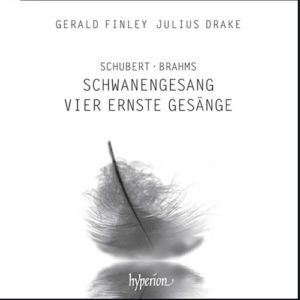Julius Drake and his frequent collaborator, bass-baritone Gerald Finley, will release their new recording of Schubert: Schwanengesang; Brahms: Vier ernste Gesänge on 27 September. The Hyperion release is available for pre-order now.
Richard Wigmore, in the album’s illuminating notes, writes:
“The Viennese publisher Tobias Haslinger was nothing if not a canny businessman when early in 1829, weeks after Schubert’s premature death, he marketed a collection of the composer’s last songs under the sentimental title ‘swansong’. The songs—seven settings of Ludwig Rellstab, six of a much greater poet, Heinrich Heine, and (to avoid the unlucky thirteen) the Seidl setting ‘Die Taubenpost’—are often performed as a quasi-cycle. But of course they are nothing of the sort. The only link between the Heine and Rellstab songs is that they were composed during the spring and summer of 1828, while ‘Die Taubenpost’ dates from October, only a month or so before Schubert’s premature death.
“Whereas the six Heine songs in the Schwanengesang collection, with their obsessive explorations of longing and irretrievable loss, possess a certain unity, the Rellstab settings have no connecting thread. True, the echt-Romantic theme of the distant or unattainable beloved is common to most of them. But in mood, style and structure they range wide. Three are among Schubert’s most sensuous love lyrics.”
Discussing Brahm’s inspiration for Vier ernste Gesänge, Wigmore explains:
“Over the previous few years he had suffered a string of bereavements, including his former pupil and close musical confidante Elisabeth von Herzogenberg, née von Stockhausen. His beloved Clara Schumann lay mortally ill (she died on 20 May). He too was already suffering from the first symptoms of the liver cancer that would kill him less than a year later.
“Brahms’s friend and biographer Max Kalbeck remarked how the agnostic composer ‘always liked to seek out the godless texts from the Bible’. Like the German Requiem, these meditations on last things—significantly titled ‘serious’ rather than ‘sacred’ songs—are devoid of Christian dogma. (Brahms himself described them as ‘anti-dogmatic, also in part unbelieving’.) Designed to comfort the living, and indeed Brahms himself, they are profound, unsentimental testaments to his sympathy for suffering, stoical humanity, his belief in the virtue of hard work, and the enduring power of love. Significantly, the German of Luther’s bible, with its stark monosyllables, is that much rawer than the English of the Authorized Version.”
Visit www.hyperion-records.co.uk for more information, to listen to samples from the album, and to pre-order now.

